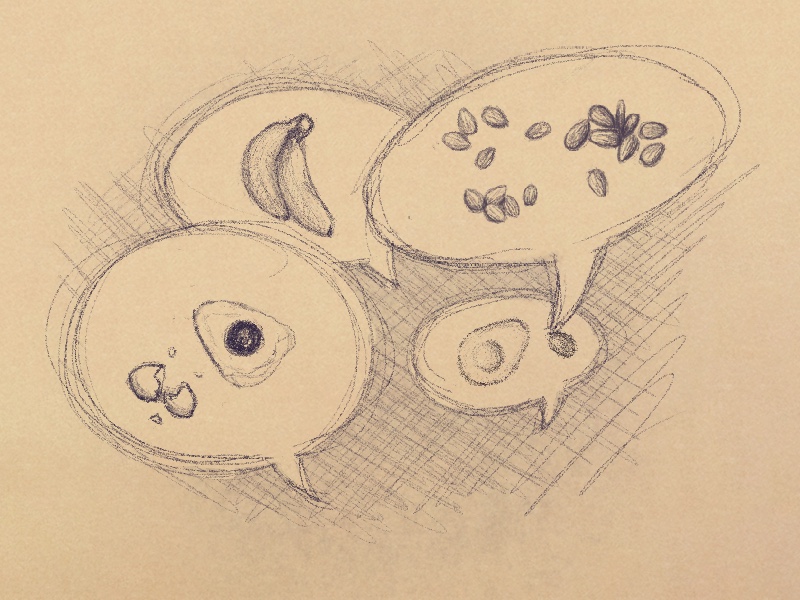By: Fleur Esteron, Myriam Durocher & Kathy Dobson
Alissa Overend began her presentation at the Food Matters and Materialities Conference with a quote from well-known food writer Michael Pollan:
“We are more confused about how to eat than any people in history.”
By that, Overend highlights how we—in Western food cultures—are overwhelmed and confused with food advice, labels, and options, feel a disconnect from traditional food practices and worry about ecological changes in the context of globalized and capitalist food systems.

Credits: Illustration by Kit Chokly.
Amidst this increasing food confusion, Overend is interested in questioning how confronted by the multiplication of food “facts,” one can think of food in terms of “singular food truths.” By that, she is referring to how we talk about food in polarizing and binary ways. For example, food is constantly framed as either bad or good, healthy or unhealthy, natural or processed, ethical or unethical, and so forth. Overend provocatively proposes that we might benefit from using a post-truth framework for accounting for the multiplication of truths concerning food—food is never just “bad or good,” “healthy or unhealthy,” or “ethical or unethical.” While offering a more nuanced and critical approach to food truths, she also suggests we question why it seems like some of these truths count more than others.
For instance, let’s consider food “truths” concerned with the healthiness of a food. Overend argues that if we only pay attention to the “what” of the food to assess its “healthiness”—such as its nutritional composition—we miss a whole array of other elements that should be considered when evaluating a food. The food industry is champion in creating and reinforcing these single food truths: many food marketing strategies now stress the “healthy” character of a food by highlighting its nutritional components and associating them with health properties. Examples of such “food truths” are common and familiar to us: we can think, for instance, of promotional messages used on specific food product labels such as “drink milk and fight cancer” or “eat cereal and prevent heart disease.”
Overend suggests that these types of marketing tactics can be approached as food truths because they contribute to framing the food as healthy on the sole basis of its (or a particular aspect of) nutritional composition. Additionally, this way of approaching food to describe whether it is “healthy” or not is informed by what Australian food theorist Gyorgy Scrinis calls a nutricentric approach to food. Approaching food this way contributes to focusing on the nutritional composition and/or biochemical properties of food, hence obscuring, as Overend puts it, “the cultural, geographical, and ecological contexts in which food, diets, and health are situated.” For Overend, such a reductive way of approaching food contributes to exaggerating the role of nutrients in determining one’s health and increasing the perception that individuals are solely responsible for their health through ingesting the “appropriate” foods.
Critical of this reductive approach to food and health, Overend encourages us to move away from singular food truths since it can only increase the confusion surrounding food and health amidst the sea of contradictory information and advice. Instead, she urges us to acknowledge and accept that there are many “truths” to the food we consume. For example, she highlights foods’ cultural dimensions, illuminating how certain foods are consumed because of cultural or family traditions, childhood memories, traditional foodways, or culinary knowledge. Further, these elements inform our relationship to the food we consume and potentially our (affective, relational, emotional) wellbeing.
She also points out how the relationship between food and health is much more complicated than certain “food truths” would make it seem. For example, someone might be unhealthy because of poverty, job insecurity, precarity, inadequate housing, or stress. Yet, these are all circumstances which the individual might not have much control over and can’t be resolved simply by ingesting the so-called ‘right’ food. Overend also highlights the problem with thinking that everyone’s body will react to or process ingested food in the same way:
The idea that 7 billion people are going to have the same response to any substance, like food, is absurd to me. We are varied in everything that we do […]. For some, drinking milk may be a great source of calcium, and for others, it may not be feasible for all kinds of reasons. It doesn’t make one way better or worse, but [we need] to try [to] temper those objective truths.
Overend suggests we consider using a “post-truth” framework when thinking about the endless multiplication of food “truths” currently in circulation. She suggests that we need to develop greater critical thinking about where these truths come from and if they should apply or even concern us. Such a post-truth framework might also help to decenter the focus on the “what” of foods and turn away from the universal “truths” that are supposedly applicable to all individuals. This way, we might be better equipped to consider and understand the many dimensions and contexts of food, eating, and health.
If you want to learn more about Alissa Overend’s work, you can have a look at her recent book, Shifting Food Facts: Dietary Discourse in a Post-Truth Culture (2021), in which she examines the politics of shifting food truths.